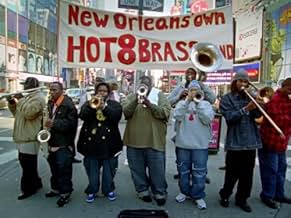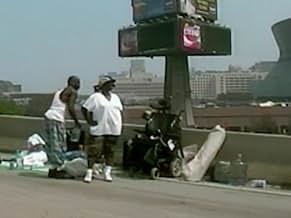Quand les digues se sont brisées: un requiem en quatre actes
Original title: When the Levees Broke: A Requiem in Four Acts
IMDb RATING
8.5/10
5K
YOUR RATING
An examination of the U.S. government's response to Hurricane Katrina.An examination of the U.S. government's response to Hurricane Katrina.An examination of the U.S. government's response to Hurricane Katrina.
- Won 3 Primetime Emmys
- 8 wins & 9 nominations total
Browse episodes
Featured reviews
10juleyda
I saw this four-hour documentary here in the city, in an arena with about 8000 other locals (I was born and raised here and this is my first visit since Katrina). It was beautiful and had me crying from the opening montage, with the incredibly beautiful New Orleans music and Blanchard's haunting score. The point of the movie seemed to me to document the horrors and outrages that the human beings in the NOLA area had to survive (as Lee said introducing the movie, be sure you have a box of Kleenex), as well as their inimitable humor and love of life that has so far been the ONLY thing to sustain the city. In the nightmare aftermath of insurance ripoffs, government incompetence and stinginess, and frequent scorn and betrayal by other "Americans," we New Orleanians now know that we have NOBODY to rely on but ourselves and each other. And after watching this movie, I am beginning to have faith that that might actually be enough. Because we are strong, resourceful, loving, fun, proud, badass people. And to his enormous credit, Spike Lee totally gets us and has really captured the soul of the city itself: its priceless daughters and sons. All of us.
Our local rag, the Times-Picayune, published a racist and misleading review of the movie on the day it was going to be screened, basically saying it only portrayed the black experience of Katrina, whatever that means. Many white people I know didn't want to see it, based on this, which is a horrible mistake. Some of Lee's movies are provocative representations of race relations; this one IS NOT, or at least, not in that sense. Please don't fall for that--the documentary shows many different views, and of course not all "black" views are the same either, as we see, for example, in the astute critique of Condi Rice's shoe shopping jaunt. Racism is certainly an issue in discussing Katrina, but this movie doesn't endorse divisiveness at all.
I think we in the US, or at least in NOLA, ought to know better than to think that we can only relate to people who look like us. I wept for and laughed and cheered almost all the interviewees in the movie, whatever their skin color. The white women in St. Bernard and the black folks from the Lower Nine, the white guy from Uptown and the creoles from around the city. Even the rich couple from Park Island, who reminded my husband of Lovey and Thuston Howell. We are all affected by the events of Katrina, not in the same ways, but that's why this movie can help us. We can see many different Katrina stories and get a bit more sense of the scope and scale of this disaster. I grew up in Gentilly Woods so I identified most with the family in Pontchartrain Park, a few blocks north, even though I'm white and they're black. Go figure.
The bigger point is, white people need to stop freaking out about race and whether NOLA is a "chocolate city" or not, and look at the real problems: the wetlands, the federal, state, and local neglect of the levees, and the problems that preceded: education, economy, infrastructure. Those affect everyone in the city, and people outside NOLA should take heed, these are not just our problems either. This could happen to you.
Our local rag, the Times-Picayune, published a racist and misleading review of the movie on the day it was going to be screened, basically saying it only portrayed the black experience of Katrina, whatever that means. Many white people I know didn't want to see it, based on this, which is a horrible mistake. Some of Lee's movies are provocative representations of race relations; this one IS NOT, or at least, not in that sense. Please don't fall for that--the documentary shows many different views, and of course not all "black" views are the same either, as we see, for example, in the astute critique of Condi Rice's shoe shopping jaunt. Racism is certainly an issue in discussing Katrina, but this movie doesn't endorse divisiveness at all.
I think we in the US, or at least in NOLA, ought to know better than to think that we can only relate to people who look like us. I wept for and laughed and cheered almost all the interviewees in the movie, whatever their skin color. The white women in St. Bernard and the black folks from the Lower Nine, the white guy from Uptown and the creoles from around the city. Even the rich couple from Park Island, who reminded my husband of Lovey and Thuston Howell. We are all affected by the events of Katrina, not in the same ways, but that's why this movie can help us. We can see many different Katrina stories and get a bit more sense of the scope and scale of this disaster. I grew up in Gentilly Woods so I identified most with the family in Pontchartrain Park, a few blocks north, even though I'm white and they're black. Go figure.
The bigger point is, white people need to stop freaking out about race and whether NOLA is a "chocolate city" or not, and look at the real problems: the wetlands, the federal, state, and local neglect of the levees, and the problems that preceded: education, economy, infrastructure. Those affect everyone in the city, and people outside NOLA should take heed, these are not just our problems either. This could happen to you.
10giatime
Let me explain this in terms everyone can understand. This is not an issue about Republican or Democrat, Left or Right. This is about justice. When a Government that is responsible for it's people turns it back on an entire State for immoral reasons someone needs to be accountable. This documentary explains in detail what happens when a government any government is not held accountable. There are no glass houses. Heed it's warning. One day it could be you floating down main street. Or burning up from global warming gone mad. This film is terrifying in the sense that it wasn't filmed in a Hollywood studio with some lame like Bruce Willis saving the day and all is well. This is real. And if you can stomach it, watch it. Invite a friend to watch it. And demand accountability from the people that are supposed to work for all of us. What does it say, when the richest country in the world lets it's most weak, sickest, poorest, young and old rot in a major city for over 7days? Watch this documentary and you answer that question yourself.
A requiem is a service intended to express the emotions and beliefs of the survivors at the death of a loved one. A requiem is not an autopsy to determine the cause of death, and if Spike Lee intended a requiem, I think he has succeeded. Criticism that this film is not analytical and precise is actually a complaint that this was not an autopsy--but none was intended.
One day a documentary may be made which closely follows the chronology of the storm and the failure of the levees. A documentary may more closely focus on the devastation of the Mississippi Gulf Coast, and the equally shameful failure of government to deal with the problem there. A documentary may be made which focuses on how daily life has changed for those of us who survived. I don't think Spike Lee intended to cover all of those points. The points he did address were very well presented.
The film is outstanding at communicating the grief, suffering and frustrations of the persons shown in the film. It is a very moving expression of emotion and belief, which is the purpose of a requiem.
I don't think the lack of government response is simply and solely attributable to racism, but that may be because I am white. In the film, that opinion was frequently expressed, but I also note that there were also some opinions expressed about the levees being intentionally dynamited. I think Spike Lee undercut the impact of his major premise by including a rumor that seems similar to the myths of Bigfoot or Elvis being alive.
I think the gross government ineptitude, inertia and political games are all well-documented, and the bottom line is that those persons who were financially able to take care of themselves fared better than those who were not--it's a matter of class and wealth, and not so much a matter of race.
In yesterday's news, it was noted that Congress earlier appropriated $17 billion to build new houses in the affected areas, and that as of this date (August 22, 2006), not a single house has been built with that money in either Louisiana or Mississippi.
One day a documentary may be made which closely follows the chronology of the storm and the failure of the levees. A documentary may more closely focus on the devastation of the Mississippi Gulf Coast, and the equally shameful failure of government to deal with the problem there. A documentary may be made which focuses on how daily life has changed for those of us who survived. I don't think Spike Lee intended to cover all of those points. The points he did address were very well presented.
The film is outstanding at communicating the grief, suffering and frustrations of the persons shown in the film. It is a very moving expression of emotion and belief, which is the purpose of a requiem.
I don't think the lack of government response is simply and solely attributable to racism, but that may be because I am white. In the film, that opinion was frequently expressed, but I also note that there were also some opinions expressed about the levees being intentionally dynamited. I think Spike Lee undercut the impact of his major premise by including a rumor that seems similar to the myths of Bigfoot or Elvis being alive.
I think the gross government ineptitude, inertia and political games are all well-documented, and the bottom line is that those persons who were financially able to take care of themselves fared better than those who were not--it's a matter of class and wealth, and not so much a matter of race.
In yesterday's news, it was noted that Congress earlier appropriated $17 billion to build new houses in the affected areas, and that as of this date (August 22, 2006), not a single house has been built with that money in either Louisiana or Mississippi.
10khereth
By far and away the best documentary on Katrina and what happened to the people of my home, New Orleans. It captures the anger, the despair, the fear, and the humanity of our country's greatest disaster. I still cry when I see my city under water. I cry even more knowing others did not receive equal assistance because of the color of their skin. I was concerned that Spike Lee would put his spin on this tragedy, but he has done the opposite. He allows citizens from all over the city, economic and racial backgrounds to tell the real story. He gives a fair and balanced perspective on how all levels of our government failed the people of New Olreans and a good portion of the Gulf Region. I only hope that Mr. Lee comes back in a few years to film another documentary, "The City New Orleanians Re-Built".
Thank you Spike and all the people at 40 Acres and a Mule for doing what had to be done - recording the real story. I see heaps of Emmys.
Thank you Spike and all the people at 40 Acres and a Mule for doing what had to be done - recording the real story. I see heaps of Emmys.
Spike Lee has made his most powerful work yet with "When The Levees Broke". It has only been one night and two hours, but this documentary has moved me in such a way. I lived to see this on television but nothing quite put me in the middle of this disaster than this documentary. In depth interviews with the mayor, governor and citizens of New Orleans and the Ninth Ward was so stripped down and raw, I couldn't do anything but weep. This is really the first motion picture or anything of that like to make me cry. I felt like I was there and experienced it. One thing that I applaud Spike for was keeping it real. Nothing was censored, which comes to no surprise because it's on HBO, but vivid portrayals of the environment such as dead bodies or backed up sewage, were shown and even when it wasn't you felt like you could see or smell it. The frustration of the people of New Orleans pierces your heart and you could do nothing but feel for them. In two hours, "When The Leeves Broke" taught me things and gave a lot of insight on the Hurricane Katrina fiasco. I eagerly await the final two hours.
Did you know
- TriviaThe score for When the Levees Broke was re-used in the 2018 Spike Lee Joint BlackKklansman.
- ConnectionsFeatured in 50 Documentaries to See Before You Die: Episode 1 (2011)
Details
- Runtime51 minutes
- Color
- Sound mix
- Aspect ratio
- 1.78 : 1
Contribute to this page
Suggest an edit or add missing content

Top Gap
What is the Spanish language plot outline for Quand les digues se sont brisées: un requiem en quatre actes (2006)?
Answer






















